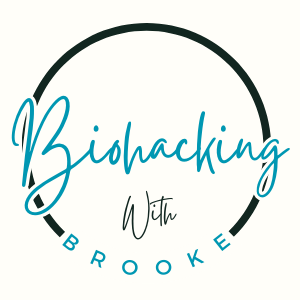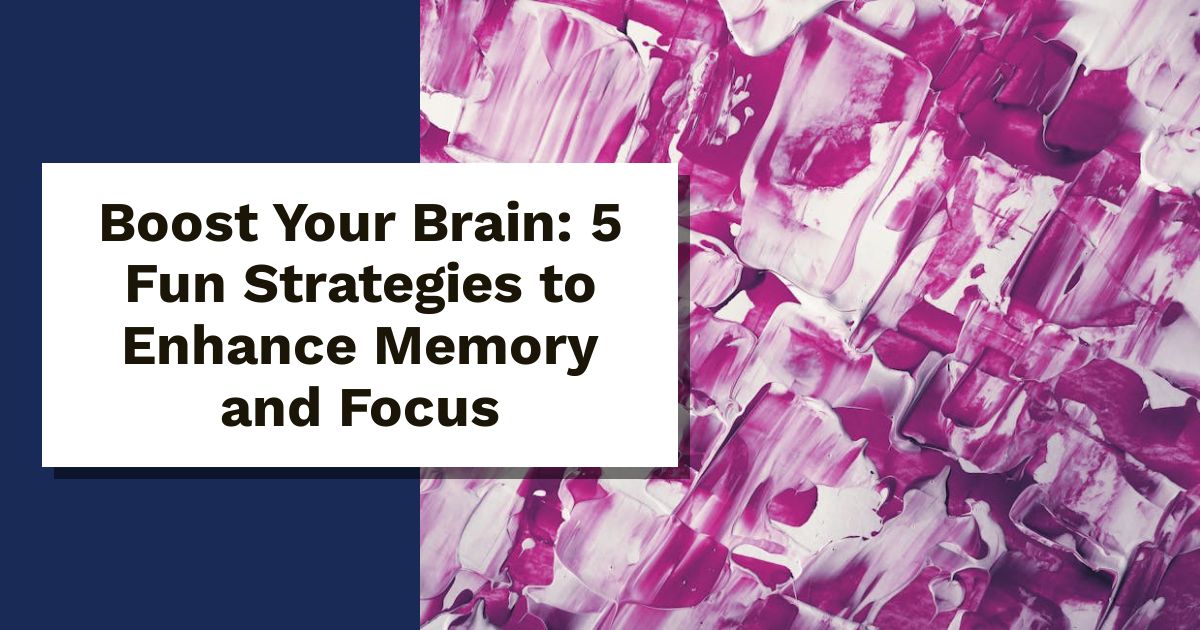Memory and focus are your brain’s superpowers. They help you tackle daily tasks and chase your goals. But let’s face it: distractions are everywhere. Whether it’s a buzzing phone or a wandering mind, staying sharp can feel like a challenge.
Don’t worry, though! You can boost your memory and focus with a few fun strategies. In this post, we’ll share five simple tips that can make a real difference. So, if you’re ready to power up your brain and sharpen those skills, let’s dive in!
Get Moving: Physical Activity
Physical activity is more than just a way to stay fit. It’s a powerful tool that can substantially boost mental clarity and cognitive function. When you get your body moving, you’re not only enhancing your physical health; you’re also improving your brain health. So, let’s explore how exercise can supercharge your mental performance.
Why Exercise Matters
Engaging in regular physical activity offers impressive benefits for your brain. Studies indicate that exercise can enhance attention, focus, and memory. When you exercise, your body releases endorphins—those delightful chemicals that can improve your mood and reduce stress levels. This shift promotes clearer thinking and a more positive outlook, which are crucial for effective learning and memory retention.
Research shows that even moderate exercise can lead to immediate cognitive improvements, helping you think better and solve problems more effectively. It’s a win-win! For more in-depth insights, check out Physical Activity Boosts Brain Health.
Fun Ways to Stay Active
The good news is that staying active can be a blast! You don’t have to hit the gym to get your workout in. Here are some enjoyable activities that can contribute to your physical activity goals:
- Dancing: Whether it’s salsa, hip-hop, or just grooving to your favorite track at home, dancing gets your heart pumping and puts a smile on your face.
- Hiking: Explore nature while getting a great workout. Hiking not only challenges your body but also your mind as you navigate trails.
- Playing Sports: Join a local team or grab some friends for a casual game of basketball or soccer.
- Yoga: Improve your flexibility and relaxation while boosting your mental clarity. It’s a mind-body workout that pays off in spades.
- Swimming: A low-impact exercise that’s easy on the joints yet fantastic for building strength and endurance.
Need more ideas? Discover 40 Fun Ways to Exercise Without Realizing It for more engaging ways to keep moving.
Incorporating these fun activities into your routine not only helps you stay fit but also enhances your cognitive abilities. Why not give them a try?
Nourish Your Brain: Diet Tips
Your brain deserves the best fuel to function at its highest level. The right foods can enhance memory, increase focus, and improve overall cognitive health. Here’s how you can nourish your brain through diet.
Foods to Fuel Your Brain
When it comes to boosting brainpower, certain foods stand out. Think of these as your brain’s best friends:
- Berries: Blueberries, strawberries, and blackberries pack a punch with antioxidants that can protect your brain from oxidative stress. They help improve communication between brain cells, which is crucial for memory and learning. A study on foods linked to better brainpower indicates that berries may lower the risk of cognitive decline.
- Nuts: Nuts, especially walnuts, are powerhouse snacks that contribute healthy fats and proteins to your diet. They are rich in omega-3 fatty acids, which are vital for brain function. Walnuts are known to have antioxidant properties, and they may even enhance memory. You can learn more about the benefits of nuts for brain health in this resource.
- Fish: Fatty fish, like salmon, trout, and sardines, are fantastic for brain health. They are loaded with omega-3 fatty acids, which support cognitive function and promote brain cell growth. Regular consumption of fish can help improve memory and emotional health. For details on various “brain foods,” take a look at this article on 11 brain foods that benefit memory, concentration, and mood.
Integrating these foods into your meals is simple. Try adding berries to your morning smoothie, snacking on nuts throughout the day, or enjoying a fish dish a few times a week. Your brain will thank you!
Hydration is Key
Staying hydrated is often overlooked, but it plays a crucial role in brain function. When your body is well-hydrated, your brain performs better. Here’s why drinking enough water matters:
- Cognitive Performance: Even mild dehydration can affect focus and memory. Studies show that staying hydrated can enhance mood, energy levels, and cognitive performance. For more insights, check out the Cognitive Effects of Proper Hydration.
- Mood and Attention: Dehydration can make you feel tired and irritable. Drinking enough water can lift your spirits and keep you alert. An article on how hydration affects cognitive function explains the benefits of maintaining a good hydration level.
Aim to drink plenty of water throughout the day. A good rule of thumb is to consume at least eight 8-ounce glasses daily—more if you’re active or in a hot climate. Keeping a water bottle nearby can remind you to hydrate!
Incorporating brain-healthy foods and staying hydrated are simple yet powerful ways to boost your memory and focus. Why not start today?
Mindfulness and Meditation Techniques
In today’s fast-paced world, finding moments of peace can feel impossible. However, mindfulness and meditation offer simple yet powerful techniques to enhance focus and memory. Let’s explore some approachable methods for getting started and the benefits of being present in the moment.
Simple Meditation Practices
Meditation doesn’t have to be complicated. Here are a few basic techniques that anyone can try, whether you’re at home, in a park, or even at your desk:
- Breathing Exercises: Sit comfortably and focus on your breath. Inhale deeply for a count of four, hold for four, and exhale over four counts. Repeat for a few minutes. This helps center your thoughts and calms your mind. For a step-by-step guide, check out Learn How to Meditate.
- Mindfulness Walks: Take a walk and pay attention to your surroundings. Notice the colors, sounds, and sensations under your feet. This practice helps ground you and takes your mind off distractions.
- Body Scan: Lie down comfortably and mentally scan your body from head to toe. Notice any tension and consciously relax those areas. This technique connects your mind and body, enhancing your awareness. Learn more about other techniques at 28 Best Meditation Techniques for Beginners to Learn.
- Guided Meditation: Use apps or online resources that offer guided meditations. These can provide structure and support, making it easier for beginners. Platforms like Meditation 101 can be great starting points.
Finding a few minutes each day to practice these techniques can create a calming routine that sets a positive tone for the day.
Benefits of Mindfulness
Practicing mindfulness can significantly improve your memory and focus. Here’s how being present helps:
- Enhanced Concentration: Mindfulness trains your brain to focus on one task at a time, reducing multitasking distractions. This results in improved attention spans and higher productivity.
- Stress Reduction: Mindfulness practices can lower stress levels, which often interferes with memory. When you manage stress better, you create a clearer mental space for learning and retention. Research shows that practicing mindfulness can lead to better mental clarity; check out The Benefits of Mindfulness for more details.
- Improved Memory: Engaging in mindfulness techniques makes it easier to store and recall information. Mindfulness encourages a state of awareness that enhances memory consolidation, allowing your brain to process and organize new information effectively.
- Emotional Regulation: Being mindful helps you notice your emotional responses, allowing you to manage them better. This balance supports cognitive functions, making it easier to focus and remember critical information. For insights into how mindfulness can improve your overall health and well-being, refer to the article on Benefits of Mindfulness.
Incorporating mindfulness and meditation into your daily routine can lead to meaningful improvements in memory and focus. Why not start today?
Quality Sleep: The Unsung Hero
Quality sleep is often overlooked but is essential for enhancing memory and focus. When you sleep well, your brain performs at its best. It’s during those hours of rest that your mind processes the day’s activities and strengthens your memory. To unlock your brain’s true potential, let’s explore how to improve sleep quality and understand the science behind sleep’s role in memory consolidation.
Sleep Hygiene Tips
Creating a bedtime routine can drastically improve your sleep quality. Here are some useful tips for better sleep hygiene:
- Stick to a Regular Schedule: Go to bed and wake up at the same time every day, even on weekends. This helps regulate your body’s internal clock.
- Create a Relaxing Environment: Keep your bedroom dark, quiet, and cool. Consider using blackout curtains, earplugs, or a white noise machine to block out disturbances.
- Limit Electronic Use: Turn off screens at least an hour before bed. The blue light from devices can interfere with your body’s natural sleep-wake cycle.
- Watch Your Diet: Avoid big meals, caffeine, and alcohol close to bedtime. These can disrupt sleep patterns and lead to restless nights.
- Establish a Bedtime Routine: Create a calming pre-sleep ritual. This could include reading a book, taking a warm bath, or practicing relaxation exercises.
- Be Mindful of Naps: Limit daytime naps to 20-30 minutes to avoid interfering with nighttime sleep.
For more tips on improving your sleep hygiene, check out Mastering Sleep Hygiene.
The Science of Sleep
Sleep is not just a period of rest; it’s a vital process that helps consolidate memories. Here’s how:
- Memory Strengthening: During sleep, your brain processes and strengthens memories from the day. The phase of deep sleep is particularly important for this consolidation. This means that the more quality sleep you get, the better your ability to remember information.
- Linking New and Old Memories: Sleep also aids in forming connections between new memories and existing knowledge. This helps you understand and retain new information more effectively.
- Removing Unnecessary Data: Interestingly, while you sleep, your brain works to prune unnecessary memories, making space for new ones. This process helps ensure that your learning remains efficient and relevant.
For a deeper understanding of sleep’s role in memory, explore How Memory and Sleep Are Connected.
Emphasizing quality sleep is essential for anyone looking to boost memory and focus. It’s time to make sleep a priority in your daily routine!
Power of Routine: Consistency is Key
Embracing a routine can be a game-changer. The power of consistency helps boost your memory and focus. When you incorporate a structured daily schedule into your life, it creates a sense of stability. Here’s how you can harness that energy.
Creating a Daily Schedule
Crafting a well-thought-out daily schedule doesn’t have to be complicated. It’s all about finding what works for you. Here are some practical tips to get started:
- Write Everything Down: Begin by jotting down all the tasks you need to accomplish. This helps clear your mind and gives you a visual plan for the day.
- Identify Priorities: Determine which tasks are the most important. Focus on completing these first; it sets the tone for a productive day.
- Block Off Your Time: Use a calendar to allocate specific time slots for tasks. This visual representation can remind you to stay on track.
- Cluster Similar Tasks: Grouping similar types of tasks can boost efficiency. For instance, dedicate a block of time to answer emails instead of scattering them throughout the day.
- Be Flexible: Life happens! Allow yourself room to adjust as needed. Rigid plans can lead to frustration, so adaptability is key.
Need more tips? Check out 8 Steps To Create a Daily Schedule for a detailed guide.
Stick to Your Plan
Staying committed to your schedule offers immense benefits. Here’s why sticking to a routine can enhance your memory and focus:
- Reduced Stress: A predictable schedule can lower anxiety. When you know what’s coming, you can plan better and manage your time more effectively. Learn more about this in Health Benefits of Having a Routine.
- Improved Focus: Regular routines train your brain to expect certain tasks at specific times. This conditioning can sharpen your attention and help you concentrate better.
- Enhanced Sleep Patterns: Following a consistent daily routine can lead to better sleep. Quality sleep is essential for memory consolidation. Discover more about the importance of routines on your mental health in Why Routines Are Really Good for Your Health.
- Positive Habits: As you stick to your schedule, you develop healthy habits. These habits can lead to overall improvements in well-being and productivity.
Integrating a routine into your life can significantly boost your memory and focus. Why not give it a shot?
Conclusion
Boosting memory and focus doesn’t have to be a daunting task. By incorporating physical activity, a brain-friendly diet, mindfulness practices, quality sleep, and a consistent routine into your life, you can sharpen your mental abilities.
Change takes time, so be patient with yourself as you try these strategies. Start small, choose one or two techniques, and gradually add more as you feel comfortable.
Take charge of your mental power today. Why not create a plan to implement these tips? Your brain will thank you!
Brooke is a rock-climbing 🧗♀️, tennis-playing 🎾, biohacking 🧬 bookworm 📚 on a mission to unlock the secrets of health, longevity, and living life to the fullest 🌟. When she’s not scaling cliffs, hitting the courts, or testing out the latest hacks, you’ll find her nose in a book or adventuring with her four-legged best friend 🐕 by her side. With a knack for turning science into simple, actionable tips, Brooke’s writing is your guide to hacking your biology and living your best, most vibrant life!


